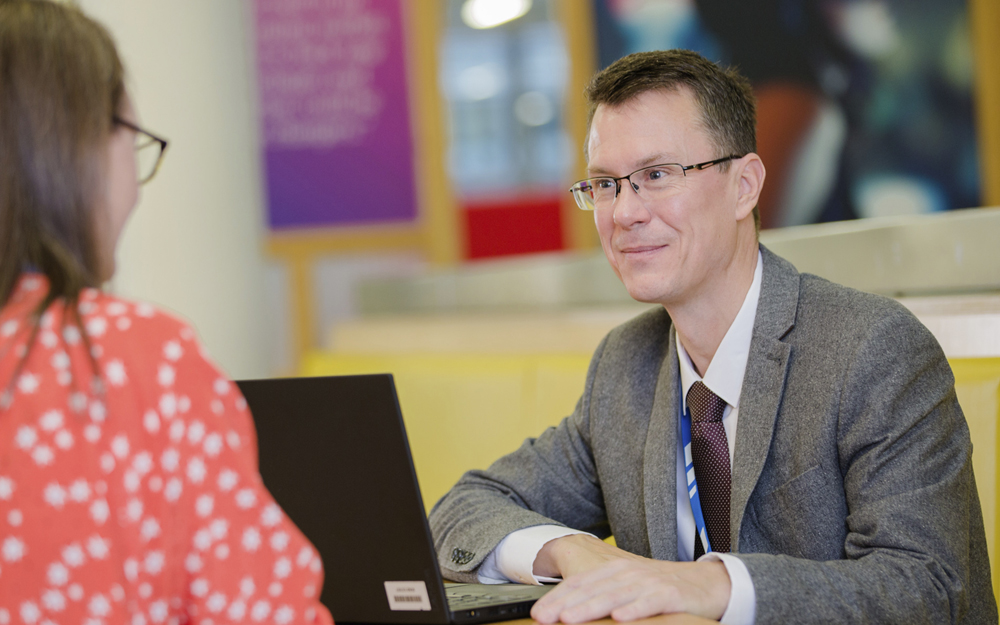Cutting carbon emissions
Andrew, Head of Project Delivery at National Grid, specialises in the process of carbon capture usage and storage (CCUS). With potential to make a significant contribution to tackling climate change, CCUS allows us to store greenhouse gases, rather than releasing them into the air.
Unlocking a sustainable future by locking away carbon
My current work focuses on a process known as carbon capture usage and storage. It’s a technological method of capturing, transporting and storing greenhouse gas emissions, rather than releasing them into the atmosphere. It’s particularly applicable to large industries, such as steel, glass and cement manufacturing and power generation.
One of the key projects I’m looking at now aims to deliver the world’s first net zero carbon industrial cluster by 2040, which would have huge environmental and societal benefits.
One of the key projects I’m looking at now aims to deliver the world’s first net zero carbon industrial cluster by 2040, which would have huge environmental and societal benefits.
Bringing carbon capture to Yorkshire and Humber
Between 2011 and 2015, National Grid developed a full-chain carbon capture and storage project in the Yorkshire & Humber region, as part of a UK Government-run competition. The project assessed the potential for a new-build power station in the region and capturing, transporting and storing the carbon dioxide deep under the seabed in the North Sea.
We had a multi-talented, diverse team who developed an onshore and offshore transportation system (for carrying liquid carbon dioxide) and undertook detailed appraisal work on a geological store, called Endurance, about 1.5km below the seabed. Endurance is classed as a saline aquifer, which is a porous rock full of brine, into which we can safely inject and store the liquid carbon dioxide.
Collaborating to create a zero-carbon cluster
CCUS has been through a short hiatus. However, global concerns over climate change and the UK Government legislating for Net Zero in 2050 means that politicians, the public and industry need to consider all solutions to help us all achieve this goal.
We’ve now reinvigorated our project and – with our partners Drax and Equinor, and wider industry in the region – we are not only looking at carbon capture but also hydrogen production, which is seen as complementary to large-scale electrification plans in the UK.
Hydrogen is also a way of decarbonising hard-to-reach sectors of our economy. While our target is to make the Humber’s industrial cluster low carbon by 2039 and ‘net zero’ by 2040, it’s possible that, with collaborative effort, we could achieve this goal between 2030 and 2035.
Achieving longstanding personal ambitions
From my school days, I knew I wanted to be an engineer; I felt it was a career through which I could make a difference and now I can make a significantly positive environmental impact.
Collaborating for net zero
Engineers and scientists are key to unlocking our sustainable future and I believe the Net Zero 2050 timeline is necessary and achievable, but requires urgency in action from everyone. It will be a truly collective effort, for example public and private sectors working closely with one another to speed up our progress.
Engineers and scientists are key to unlocking our sustainable future...
Engineering is about innovation and optimisation. To address the challenge of climate change we will require both and we will need to measure sustainability in such a way as to navigate the fewest pathways. Our society and economy is still growing and we would want to maintain our quality of life.
2020s vision for climate change
New, sustainable low-carbon technologies need to be commercially developed before 2030 and are critical to compliment natural carbon cycles. Only with these can we provide the secure energy, products and services we use on a daily basis. Once developed during the 2020s, we would look to scale these technologies up and meet the challenge of Net Zero in 2050. I believe that what we achieve in the next decade will dictate if the Net Zero target is still achievable or extremely hard.
